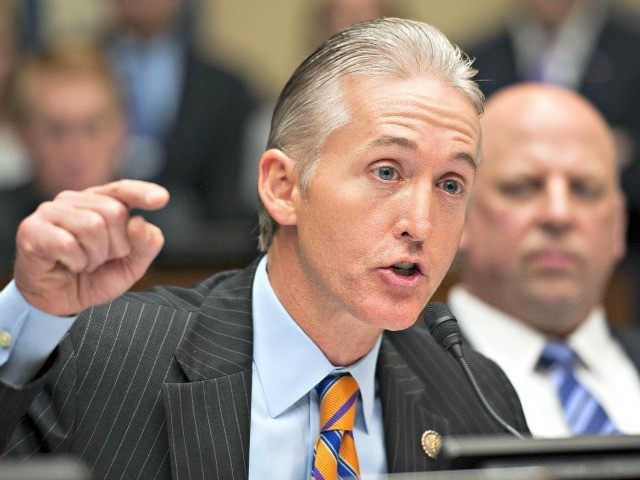Then-Secretary of State Hillary Clinton used her position to help her secret adviser Sidney Blumenthal’s private business interests in Libya, according to bombshell revelations by House Benghazi Committee chairman Rep. Trey Gowdy.
Gowdy sent a letter to his Committee colleague Rep. Elijah Cummings, released Thursday, revealing the existence of a business scheme between Clinton and Blumenthal conducted on private email accounts. The letter also promises a devastating new Clinton email dump in the “next five days.”
Gowdy highlights an email that Blumenthal sent to Clinton on July 14, 2011. At the time, Blumenthal was feeding Clinton private intelligence on Libya, where Clinton led a U.S. invasion by relying primarily on Blumenthal’s intelligence.
Gowdy wrote that “at the same time Blumenthal was pushing Clinton to war in Libya, he was privately pushing a business interest of his own in Libya that stood to profit from contracts with the new Libyan government – a government that would exist only after a successful U.S. intervention in Libya that deposed Qaddafi.”
Blumenthal has denied, through his lawyer, that he was on the payroll of the military consulting firm Osprey Global Solutions, which was looking to expand its business in Libya with the post-Qaddafi transitional government (TNC). Blumenthal pushed on at least one occasion to get funding for the group’s projects and promoted to Clinton a Libyan government adviser that Osprey was trying to win over for private dealings.
The new emails reveal that Blumenthal and the other two sources feeding Clinton intelligence on Libya were all acting as “honest brokers” for Osprey to get a government contract in Libya. And Clinton was willing to help them out.
“The company is a new one, Osprey, headed by former General David Grange, former head of Delta Force,” Blumenthal wrote to Clinton. “Osprey will provide field medical help, military training, organize supplies, and logistics to the TNC…This is a private contract. It does not involve NATO…The TNC wants to demonstrate that they are pro-US. They see this as a significant way to do that. They are enthusiastic about this arrangement.”
“Tyler, Cody and I acted as honest brokers, putting this arrangement together through a series of connections, linking the Libyans to Osprey and keeping it moving,” Blumenthal wrote, referring to former CIA agent Tyler Drumheller and Cody Shearer, Blumenthal’s top two sources for the intelligence he sent to Clinton.
Clinton forwarded the email to her State Department aide Jacob Sullivan, instructing Sullivan to read the email and “discuss with me at hotel.” She replied to Blumenthal, assuring him that she would call him tomorrow for follow-up.
“Just met with TNC again, but signed no contracts! Thx,” Clinton wrote.
Blumenthal kept sending Clinton briefings promoting Osprey Global Solutions, according to Gowdy.
Gowdy was clear in his letter that Blumenthal barely knew anything about Libya.
“While Blumenthal, an old friend of the Clinton’s, admittedly knew little about Libya and had not ever been to Libya, Clinton seemingly read every one of his emails on the topic that began appearing out of nowhere in February 2011,” Gowdy wrote.
“Nearly half of all the emails sent to and from Secretary Clinton regarding Benghazi and Libya prior to the Benghazi terrorist attacks involved Sidney Blumenthal,” Gowdy added.
Gowdy said that Blumenthal stonewalled his Committee:
Let me also address the allegation you keep making that federal marshals appeared at Blumenthal’s house to serve him with a subpoena,” Gowdy wrote to Cummings. “Committee staff called Blumenthal directly to discuss with him the possibility of appearing before the Committee in a transcribed interview. Committee staff left a message with Blumenthal’s wife and asked him to call back. But Blumenthal never did, ignoring this Committee’s request to speak with him.
Gowdy was “forced to use the U.S. Marshals service to serve him with a subpoena,” which Gowdy described as “standard operating procedure.”
Gowdy’s committee will release 500 pages of Blumenthal emails and 1,500 emails “within five days.”

COMMENTS
Please let us know if you're having issues with commenting.